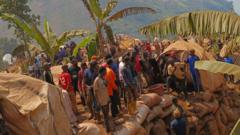Joseph Kabila's homecoming to the Democratic Republic of Congo raises questions about his influence and the complex political landscape as tensions with Rwanda and militia activities escalate.
Kabila Returns to Congo Amidst Treason Accusations and Ongoing Conflict

Kabila Returns to Congo Amidst Treason Accusations and Ongoing Conflict
Joseph Kabila, the former president of the Democratic Republic of Congo, returns to a politically charged environment after being accused of treason linked to militia support.
Joseph Kabila, the former president of the Democratic Republic of Congo, has returned to his home country after years of self-imposed exile, shortly after being accused of treason by the Congolese Senate. Kabila is alleged to have supported the M23 militia, which has seized significant portions of Congolese territory this year. Despite these serious allegations, he arrived in Goma, a city currently under the control of M23, effectively evading government authorities in Kinshasa.
Kabila's re-entry occurs amid heightened diplomatic efforts from the United States to facilitate peace negotiations between Rwanda and Congo, complicated by Kabila's presence, who is perceived to retain considerable political clout. In a recent video address, Kabila openly criticized current President Felix Tshisekedi, whom he branded as a dictator. This return comes after an electoral defeat in 2018 when Kabila’s successor was declared the winner under controversial circumstances, a situation that saw the two leaders initially share power before falling out over reform agendas.
Upon his arrival in Goma, Kabila received warm greetings from Corneille Nangaa, the political leader of M23, an entity that once took a different political route as the head of Congo’s electoral commission. With Kabila’s aspirations to re-enter politics surfacing amid rising militia activities, his motivations and the implications of his return remain to be seen, signaling potential new complexities in the already challenging regional dynamics.



















